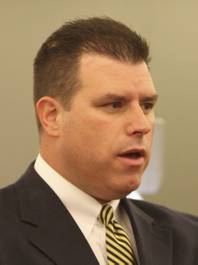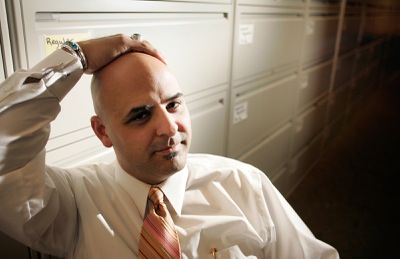Sunday, Jan. 30, 2011 | 2 a.m.
Sun Coverage
Sun archives
- Caesars Entertainment sues man over $140,247 gambling debt (1-23-2011)
- Man enters plea over charges tied to $3.75M in markers (2-22-2010)
- Wisconsin man indicted over $3.75 million Las Vegas gambling debt (2-10-2010)
- Warrant issued for ballplayer Shawn Chacon over gambling markers (10-2-2009)
- Bellagio: Indicted billionaire owes $258,480 gambling debt (9-1-2009)
- The Wynn sues Barkley, claims $400,000 gambling debts unpaid (5-15-2008)
- His job is to get your debt (4-11-2008)
- Lawsuit to target bad check collection system (1-5-2006)
After high roller Andrew Pham racked up more than $1 million in gambling debts more than four years ago in Las Vegas, the seven casinos stiffed by him turned to the Clark County district attorney’s office for help. By the time the dust settled eight months ago, Pham had pleaded guilty, was ordered to pay the debt and was placed on informal probation with an order to “stay out of trouble.”
He has not yet repaid any of the money.
Another gambler who owed about $1 million has been repaying casinos $7,000 a month for more than three years — and is not expected to make good on his full debt before 2019. Meanwhile, he’s known to still be gambling in town.
Officials at the Las Vegas Hilton, one casino owed money, complain of what they call an egregious delay in restitution for an undisputed crime.
Such is the challenge in a city that regularly extends credit to its biggest gamblers: Getting them to make good on their IOUs when they lose.
Although owing someone money isn’t a crime, signing an IOU worth $250 or more without money to back it up is felony theft under a 1983 Nevada law, which defines casino markers as legally binding documents like checks.
Some casino executives complain the criminal justice system is unreliable in prosecuting deadbeat gamblers because it is plagued by delays, favors lengthy payment plans over trials or jail time, and is too overworked to stay on top of gamblers’ repayment plans.
Nevada courts are “effectively inviting future criminal conduct in this state and sending a clear message to all tourists that fraud in Nevada is an acceptable activity,” said Lou Dorn, Las Vegas Hilton general counsel.
Such concerns have escalated in the recession, as unpaid gambling debts are a bigger problem.
The district attorney processes about 100 marker cases each week and thousands a year involving big Strip resorts and smaller, neighborhood casinos. That volume has increased by 5 to 10 percent in the recession, peaking in 2009.
With the recent exception of the Hilton, casinos are typically hush-hush about their dealings with high rollers, including debt collection. Still, many face the same problem. Pham owes money to the Golden Nugget, Planet Hollywood, Treasure Island, Mirage, Venetian and Green Valley Ranch Resort, all of which sought the district attorney’s help.
Like an interest-free loan
Some casino giants have tightened credit policies since the boom years, when casinos could more easily absorb losses, and gamblers had more money to spend. But that hasn’t helped them collect on debts from the flush years.
Nevada casinos commonly grant credit to gamblers who provide evidence of sizable bank accounts to cover the IOU — or if they have a credit history with the casino that indicates debt repayment. By signing markers, the gambler essentially receives an interest-free loan from the casino with flexible terms. That makes them unusual in the business world and a unique risk for casinos, which write off as much as 5 percent of their debts — sometimes amounting to millions per year — as uncollectable. Big casinos might have hundreds of unpaid markers in the collection process at any time.
Although a gambler’s first marker triggers an application process and a bank inquiry akin to taking out a personal loan, subsequent markers involve little paperwork other than a check of the person’s gambling history with Central Credit, a credit reporting bureau for the casino industry.
In some cases, casinos will extend gamblers additional credit after they get a nod from a casino host, who is eager to keep the customer gambling — and whose pay depends in part on what the customer loses at the tables.
Generosity in offering markers is a key casino marketing tool on the Strip, where as much as 40 percent of wagering volume occurs on credit, said Jeff Voyles, a casino management professor at UNLV and industry consultant. Well-heeled gamblers may prefer signing markers for the convenience of not having to carry cash, with their casino credit showing up on pit bosses’ computers.
To avoid antagonizing players and keep them coming back, casinos generally give gamblers several months to repay debts that can run into the hundreds of thousands of dollars.
But when they don’t, casinos send a demand letter and can turn to the district attorney’s bad-check unit, which prosecutes such crimes. Or they may file a civil suit, sometimes in addition to prosecution.
Collecting can be expensive
Casinos can’t dictate how a case is handled, but any recovered debt goes to the casino. There’s no formula on when or whether to settle a marker case, as each gambler’s circumstance is different, said Bernie Zadrowski, who leads the district attorney’s bad-check unit.
Sometimes cases are delayed as the parties negotiate payment plans, or because the courts are clogged.
The Hilton, which is increasingly feeling the pinch of unpaid gambling debts in the recession, is not shy about complaining about the process.
“There’s no question a crime has occurred but we have to deal with years and years of continuances,” Dorn said. “And there’s no investigation or analysis (by the court) to determine whether (the debtor) can only afford $7,000 a month rather than $70,000 a month.”
Dorn said the Hilton only turns to the district attorney if the gambler can’t or won’t negotiate payment or can’t be found. Prosecutors can seek arrest warrants but few deadbeats are taken into custody, because they are not considered flight risks or dangers to the community.
Once in court, the next challenge is identifying the gambler’s assets.
Many casinos’ big debtors “are wealthy people who have assets hidden all over the place,” Dorn said.
Hiring a collection agency can get expensive: They charge at least 30 percent of the collected debt. And recovery is uncertain.
That’s in part why most Las Vegas casinos use the district attorney — and Nevada law — as a low-risk way to go after gamblers. The bad-check unit doesn’t charge casinos for its services; it is funded entirely by the defaulting gamblers, who must pay 10 percent of whatever is recovered.
Some defense attorneys call it a conflict of interest for a public agency and an unwarranted expenditure of public resources to prosecute gamblers whose actions shouldn’t be criminalized.
Dorn’s beef is that the system is sluggish and ineffective, with long delays, prosecutors settling for cents on the dollar and judges who are too lenient.
Marker cases are taken as serious as other criminal cases, said Chief Judge Karen Bennett-Haron of Las Vegas Justice Court.
“I realize that people don’t get their money as fast as they would like,” she said, “but we’re not a collections agency for the casinos. We use a lot of resources on these bad-check cases, and we hear them at the same time as others” involving violent crimes.
In a 2008 letter to the Hilton, then-Assistant District Attorney Christopher Lalli addressed the casino’s concerns with the case of Mario Ganon, the gambler paying off his debt $7,000 a month. Lalli said his office has “vigorously opposed defense motions to stall or delay the (Ganon) case over the last two years” and has “argued against allowing these low monthly payments and further delays ... though the court has failed to agree with us.”

Christopher Lalli
Zadrowski doesn’t assign blame for the slow process. “We’re competing for court time with thousands of other cases. So yes, there are going to be significant delays. And there are good attorneys who know how to defend these cases. It’s a system that doesn’t always produce a product of justice that offers immediate gratification.”
A problem of their own creation?
Some gamblers find themselves behind bars.
One man is expected to serve several months in a Nevada jail after failing to repay about $6,000 to two Las Vegas casinos. Records show the gambler has unpaid marker cases on file with the district attorney and a conviction in another state — circumstances that typically mean harsher sentences for debtors.
“We’ve got limited prison space, and usually you’re dealing with people who have no criminal record,” Zadrowski said. “These cases are generally handled like other theft-type cases where the person is given the opportunity for restitution” rather than jail time.
And as is typical with similar cases, the district attorney’s staff usually will first offer a plea-bargain — say, a guilty plea to a gross misdemeanor coupled with unsupervised probation and a repayment plan that carries no punishment for unpaid debt.
Some gamblers refuse to pay because they feel they were mistreated by the casino or want to get back at the place where they lost their shirt, said Greg Knapp, who ran the bad-check unit until 2005. Those gamblers, he said, sometimes try to game the system by delaying payment — while paying their attorneys tens of thousands of dollars on their defense.
Marker cases can be thorny for prosecutors, he said.
“Theft is a crime of specific intent. I don’t think anyone takes out a marker with intent of losing and not paying it back.”
“These are people who take risks and play wilder than the rest of us,” Knapp said. The economy plays a role, he said, as some gamblers have lost their means of repaying the debt when the stock market fell or in real estate investments gone sour.
Casinos create their own problems, Knapp added, by overextending credit and relying on the district attorney to clean up the mess. Some clients have received hundreds of thousands, even millions’ worth of credit when the casinos knew the gambler owed money at other Las Vegas resorts, he said.
“Why is a casino extending credit without knowing whether the person has the funds to pay it? That’s pretty stupid,” Knapp said.
Pham accumulated more than $1 million in marker debt at more than half a dozen Las Vegas casinos over a two-year period. He was a longtime player with no outstanding debts when he took out a new marker in October 2005, according to the Hilton’s testimony before a county grand jury. The casino extended him additional credit three months later and possibly before it tried to collect on the first marker.
Some members of the grand jury that indicted Pham were baffled about why casinos don’t collect soon after the marker money is gambled, and wondered why some casinos granted Pham additional markers when he owed money elsewhere.
The Hilton says it’s careful to not extend credit to gamblers who have an uncollected marker at another casino — and that most of the big casinos operate the same way.
“We’re pretty responsible here at the Hilton,” with a collection success rate of about 99 percent, collections manager Alex Montanarella said.
Still, the Hilton has at least $6 million in uncollected debt, a piece of the hundreds of millions of dollars owed to casinos across Las Vegas. That’s also money going untaxed by a state in financial need, Montanarella said.
There’s no guarantee of restitution even after a marker case is prosecuted because of the inherent complexities of casino credit and the gambler’s particular circumstances, Zadrowski said. “We’re not bill collectors ... we’re a prosecution unit.”
That can be a difficult task, as a successful conviction requires proof beyond a reasonable doubt that the gambler intended to defraud the casino — a higher burden than simply indicating that the gambler owes money. Proof that the gambler didn’t have enough money in his bank account to cover the debt when he signed the marker may not be enough to convict, as the gambler’s cash flow might be in flux, Zadrowski said.
The Hilton relies more heavily on the bad-check unit than some of its bigger and wealthier counterparts on the Strip. Court records show the casino is owed more than $600,000 by gamblers who pleaded guilty and were placed on informal probation, with no follow-up on payment. Several Hilton debtors have court-imposed payment plans, including one gambler’s monthly payments of $200 on a $138,000 marker that will take more than 50 years to pay off.
Casinos not sympathetic victims
Foreign debtors are the casino’s biggest nuisance, as they can more easily hide assets in countries that don’t cooperate in releasing bank records. Ganon is one example, and has transferred property out of his name to his family in Mexico, Hilton executives say.
“These defendants have no motivation to settle, particularly when they’re from a foreign country where civil prosecution and finding assets is very difficult,” Dorn said.
Attorneys for Ganon, who also represented Pham, could not be reached for comment.
Las Vegas casinos are owed at least $80 million from gamblers in China and Hong Kong alone. That figure represents the amount of uncollected restitution from Chinese gamblers who, like other foreign nationals, can’t be extradited for prosecution because of the red tape and expense involved, Zadrowski said.
The bad-check unit recovered about $12 million for casinos last year, down from a peak of $47 million the previous year. Zadrowski said his hardworking staff is “doing a lot more with less” these days.
“Multibillion-dollar corporations don’t make great (sympathetic) victims,” he said. “But there are real victims of crime here,” he said.
And yet, casino officials such as Dorn believe the hammer of the law has grown soft in Nevada — a dangerous prospect, he said, for the state and its chief industry.
“If the Legislature tells you this is a crime, then you prosecute it as a crime,” he said. “We’d rather not see any money for a year and have them prosecute the guy rather than have it dragged out for years with these piecemeal payments.”



Join the Discussion:
Check this out for a full explanation of our conversion to the LiveFyre commenting system and instructions on how to sign up for an account.
Full comments policy